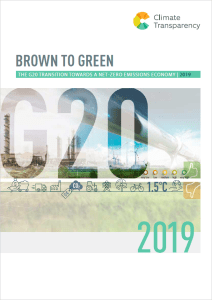Canada among three G20 countries least likely to hit emissions targets: report
Canada's plan to meet its greenhouse- gas emissions targets is among the worst in the G20, according to a new report card on climate action.
Climate Transparency issued its annual report Monday grading all the countries in the group of 20 with large economies on their climate performance and finds none of them has much to brag about. The international group compiles data on countries' emissions and policies in an attempt to push them into investing in clean technology.
The G20 nations account for 85% of global economic activity and in 2018 produced 80% of all greenhouse-gas emissions, which accumulate in the atmosphere and trap heat.

The report says about half the G20 members—19 countries with advanced economies plus the European Union collectively—are on track to meet their current targets for cutting emissions by 2030 but those targets are much too mild. If every G20 member does not drastically scale up its targets, the G20 overall will produce more emissions in 2030 than it does today, Climate Transparency said.
Canada, South Korea and Australia are the farthest from meeting targets to cut emissions in line with their Paris Agreement commitments, but those commitments are nowhere close to enough, the report says. Canada's per-capita emissions, the greenhouse gases it releases divided by the number of people who live here, are the second-highest in the G20, behind only Australia.
Canada's national reports show existing plans will leave Canada about 80 millions tonnes shy of its existing 2030 goal of 513 megatonnes of carbon dioxide and equivalents. That target is only about half as tough as it needs to be, Climate Transparency argues.
Under all current G20 targets, the world is projected to warm by 3 C by the end of the century. After 1.5 C, scientists say there is a "growing risk that critical tipping points will be crossed, at which point the Earth's system will experience major and largely irreversible changes.''
Critical water shortages will be five times greater in G20 nations at 3 C of warming, compared with 1.5 C, the report said. As well the average number of days above 35 C in G20 countries each year will exceed 50 at 3 C compared with 30 at 1.5 C. Drought, extreme rainfall, food scarcity, shorter growing seasons and greater spread of insect-borne diseases are all among the expected problems of climate change.
Extreme weather, including that caused by climate change, already kills 16,000 people a year in the G20 and costs more than $142 billion.
The report applauded Canada for introducing a national price on carbon earlier this year, and for implementing tougher environmental reviews for major projects like pipelines and mines. But it slammed the Liberal government for approving the Trans Mountain pipeline expansion a second time in June, just days after Parliament voted in favour of a Liberal motion declaring a climate emergency.
The report says Canada is among global leaders in getting rid of coal power but is a laggard on a number of fronts, including energy use and emissions from cars and buildings.
It says Canada has four times the G20 average for emissions per person from transportation and has more than twice the average emissions from buildings. Canada's economy is the third most energy-intensive in the G20, meaning only two other countries use more energy for every $1 of their economic production. While energy use is dropping in the G20 overall, Canada's energy use has stayed steady over the last five years.
Climate action was a key part of the recent federal election, with four of the five parties that elected MPs pledging to do more to cut emissions and reduce energy use. The issue is expected to take centre stage in the next Parliament.
Prime Minister Justin Trudeau promised to do better than Canada's existing 2030 commitment but did not say by how much. He also intends to get Canada to zero net emissions by 2050, meaning any emissions that do come out of Canada would be absorbed by either natural features like forests or technology like carbon capture and storage systems.
The report notes that 2020 is a critical year for climate change because it's the year Paris Agreement signatories are required to submit new national targets.
